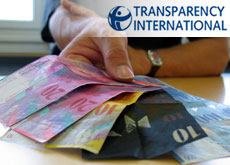Survey exposes the reality of Swiss corruption

On International Anti-Corruption Day, Anne Schwübel of Transparency International (TI) tells swissinfo that corruption remains a problem in Switzerland.
The Global Corruption Barometer, based on a 69-nation survey, shows that the Swiss public have the least confidence in politics, business and the media.
Just one per cent of the Swiss respondents admitted they had paid a bribe over the last 12 months. However, Schwübel complains that there have been very few criminal convictions for corruption since the law was tightened in 2000.
Political parties were perceived as by far the most corrupt institutions in society in 45 of the 69 countries surveyed, including Switzerland.
The private sector and the media are next in line for lack of Swiss public trust.
However, sectors such as the police, customs, the legal system and tax authorities are considered trustworthy in Switzerland, unlike in many other countries.
swissinfo: Judging from the results of this year’s survey, do you think that corruption is a problem in Switzerland?
Anne Schwübel: Of course it is a problem. For a long time it was a taboo subject and it is still not fully recognised how grave the consequences of corruption can be. Some people even think that the economy needs a certain amount of shady dealings and that it’s harmless.
swissinfo: What form does corruption take in Swiss daily life?
A.S.: We don’t have the same problem of corruption in everyday life in Switzerland as you find in many developing countries, where people have to offer bribes to access essential services.
What we have is a different kind of bribery here, related to permits or surcharges for various activities, for example in the building trade.
swissinfo: The survey shows that politics is considered the most corrupt area in Switzerland. Is this surprising?
A.S.: This is an area that receives a lot of attention here and the media and the public react very strongly when they come across cases of corruption. Although there haven’t been that many public scandals, the impression remains that corruption is a problem.
This is partly because so little is known about the financing of political parties. There is not enough openness and this generates a lack of trust among citizens.
swissinfo: How serious does the Swiss public perceive corruption to be?
A.S.: The barometer shows that people feel corruption has increased in the last three years but they don’t expect it to get worse in future. Much more has been written about corruption in recent years and the message is out there.
We now acknowledge as a society that bribery exists in Switzerland, and that there have been scandals and that Swiss business is not free from corruption.
The Global Corruption Barometer details the sectors in which bribery is most prevalent, common forms of bribery worldwide and the cost of bribery globally.
The survey was conducted for Transparency International (TI). The Swiss branch of TI in Bern is active in the areas of prevention, information and lobbying.
On UN Anti-Corruption Day, a coalition of global organisations has joined together to fight private sector corruption.
The participants are the World Economic Forum, The UN Global Compact, the International Chamber of Commerce and Transparency International.

In compliance with the JTI standards
More: SWI swissinfo.ch certified by the Journalism Trust Initiative



You can find an overview of ongoing debates with our journalists here . Please join us!
If you want to start a conversation about a topic raised in this article or want to report factual errors, email us at english@swissinfo.ch.